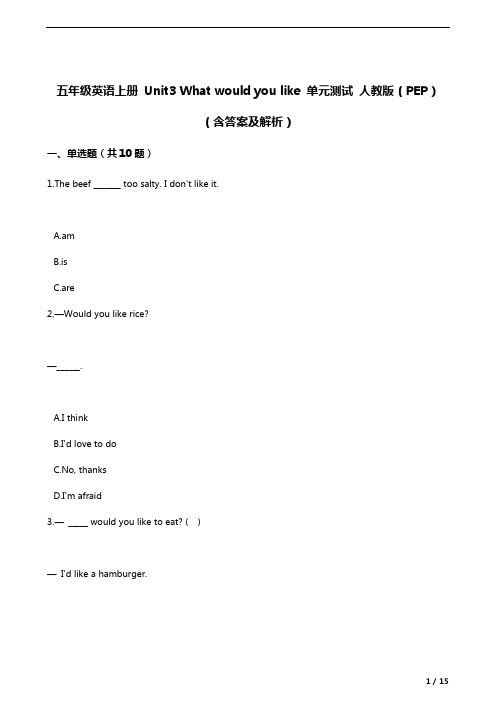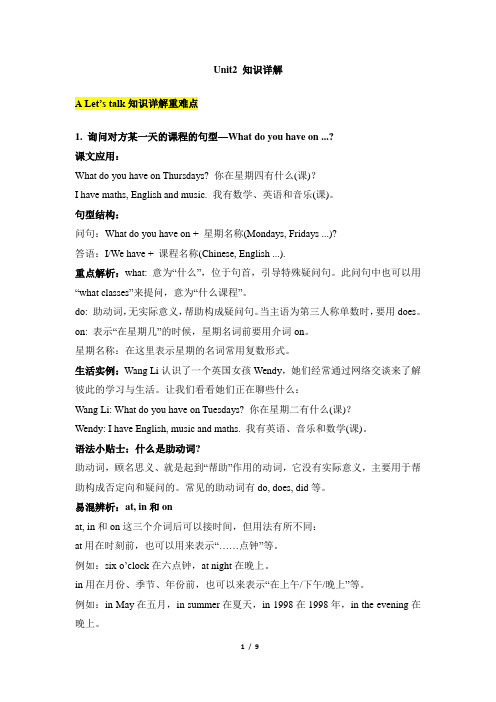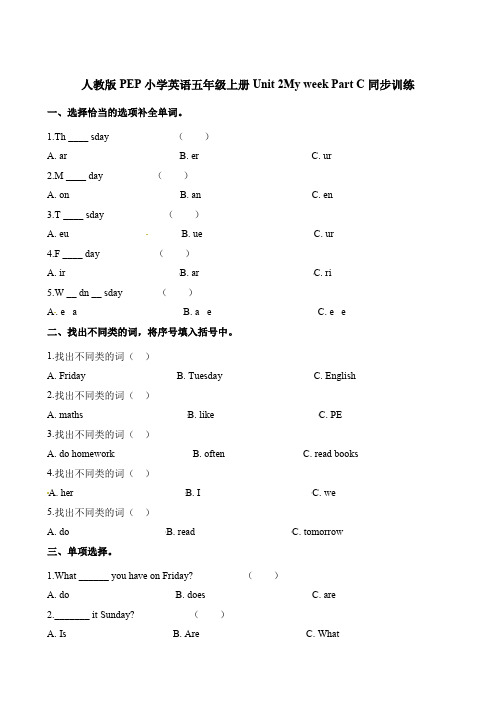PEP五年级英语(上)特殊疑问句回答训练题
- 格式:doc
- 大小:40.50 KB
- 文档页数:4

PEP小学英语五年级上册辅导资料Unit 1 My New Teachers单词考点:short矮的thin 瘦的Mr 先生like 像、喜欢strict 严格的smart 聪明的、巧妙的active 积极的、活跃的quiet 安静的、文静的very 很、非常but 但是句型考点:1. Who,What引导的特殊疑问句,用来对不熟悉的老师实行问答:Who's + 某人?What's he / she like? He / She is + 与身体特征和性格特征相关的形容词。
例:A:Who's your English teacher? B:Mr. Carter.A:What's he like? B:He's tall and strong.2. Is引导的一般疑问句,谈论某位老师是否具有某方面的特征:Is he / she + 与身体特征和性格特征相关的形容词,回答用:Yes, he / she is. No, he / she isn't.例:A:Is she quiet? B:Yes, she is.【重点句型】1.谁是你的英语老师?Carter先生。
Who’s your English teacher? Mr Carter.2.他长得什么样?他高而强壮。
What’s he like ?He’s tall and strong .3.她很安静吗?不是的。
她很活跃的。
Is she quiet ? No, she isn’t. She’s very active.4.她很严格么?是的,但她很和蔼的。
Is she strict ? Yes, she is , but she’s very kind .【句型精讲】1.Do you have new teachers? 你们有新老师吗?疑问句中要用复数2. tall and strong又高又壮能够用其他的形容词实行代换3. My English teacher has a kind heart. 我的英语老师有一颗善良的心。

五年级英语上册Unit3 What would you like 单元测试人教版(PEP)(含答案及解析)一、单选题(共10题)1.The beef _______ too salty. I don't like it.A.amB.isC.are2.—Would you like rice?—______.A.I thinkB.I'd love to doC.No, thanksD.I'm afraid3.—_____ would you like to eat? ( )—I'd like a hamburger.B.WhatC.How4.—_______ your favourite food? ()—Beef noodles.A.WhatB.How'sC.What's5.I ________ apples. My father ________ bananas.A.like,likesB.like,likeC.likes,likes6.What's favourite food?A.youB.IC.your7.I don't like this cake. It's too .A.sweetB.freshC.delicious8.I'm hungry. I'd like some .B.waterC.bread9.I like ice cream, ________ it's sweet.A.andB.butC.because10.—________—I have a sandwich for lunch.A.What's your favourite food?B.What do you have for lunch?C.Do you like sandwiches?二、填空题(共2题)11.选出下列每组单词中画线部分发音和其它两项不同的一项。

2025年人教版PEP五年级英语上册月考试卷含答案考试试卷考试范围:全部知识点;考试时间:120分钟学校:______ 姓名:______ 班级:______ 考号:______总分栏一、选择题(共7题,共14分)1、________ you like vegetables? Yes , I do .A. DoesB. DoC. Would2、选正确的答语Can the girl hear?A. Yes,he can’t see.B. No.She’s deaf.C. No,we can’t.E. No,I can’t.E. No,I can’t.3、选出不同类的单词或词组A. MumB. SundayC. Monday4、根据所提供的情景,判断以下言行是否正确在电影院里:We run and shout.A. 正确B. 错误5、根据问句选答句Can you read the book to me?A. Yes,I did.B. Four,please.C. Yes,I do.E. She bought a bag.E. She bought a bag.6、How __________ do you do it?()A. usuallyB. often7、﹣﹣____ did you go?﹣﹣I went to the Great Wall with my parents.()A. WhoB. WhereC. What评卷人得分二、填空题(共5题,共10分)8、—那辆自行车是你的吗?—是的;它是我的。
—Is that bike____? —Yes, it's____.9、____10、One day, he______ (come) in and asked the shopkeeper.11、抄写单词并在写出其中文意思。
(1)different__________________12、翻译下列句子。

Unit2 知识详解A Let’s talk知识详解重难点1. 询问对方某一天的课程的句型—What do you have on ...?课文应用:What do you have on Thursdays? 你在星期四有什么(课)?I have maths, English and music. 我有数学、英语和音乐(课)。
句型结构:问句:What do you have on + 星期名称(Mondays, Fridays ...)?答语:I/We have + 课程名称(Chinese, English ...).重点解析:what: 意为“什么”,位于句首,引导特殊疑问句。
此问句中也可以用“what classes”来提问,意为“什么课程”。
do: 助动词,无实际意义,帮助构成疑问句。
当主语为第三人称单数时,要用does。
on: 表示“在星期几”的时候,星期名词前要用介词on。
星期名称:在这里表示星期的名词常用复数形式。
生活实例:Wang Li认识了一个英国女孩Wendy,她们经常通过网络交谈来了解彼此的学习与生活。
让我们看看她们正在聊些什么:Wang Li: What do you have on Tuesdays? 你在星期二有什么(课)?Wendy: I have English, music and maths. 我有英语、音乐和数学(课)。
语法小贴士:什么是助动词?助动词,顾名思义、就是起到“帮助”作用的动词,它没有实际意义,主要用于帮助构成否定向和疑问的。
常见的助动词有do, does, did等。
易混辨析:at, in和onat, in和on这三个介词后可以接时间,但用法有所不同:at用在时刻前,也可以用来表示“……点钟”等。
lock在六点钟,at night在晚上。
例如:six o’cin用在月份、季节、年份前,也可以来表示“在上午/下午/晚上”等。
例如:in May在五月,in summer在夏天,in 1998在1998年,in the evening在晚上。

Unit2 知识详解A Let’s talk知识详解重难点1. 询问对方某一天的课程的句型—What do you have on ...?课文应用:What do you have on Thursdays? 你在星期四有什么(课)?I have maths, English and music. 我有数学、英语和音乐(课)。
句型结构:问句:What do you have on + 星期名称(Mondays, Fridays ...)?答语:I/We have + 课程名称(Chinese, English ...).重点解析:what: 意为“什么”,位于句首,引导特殊疑问句。
此问句中也可以用“what classes”来提问,意为“什么课程”。
do: 助动词,无实际意义,帮助构成疑问句。
当主语为第三人称单数时,要用does。
on: 表示“在星期几”的时候,星期名词前要用介词on。
星期名称:在这里表示星期的名词常用复数形式。
生活实例:Wang Li认识了一个英国女孩Wendy,她们经常通过网络交谈来了解彼此的学习与生活。
让我们看看她们正在聊些什么:Wang Li: What do you have on Tuesdays? 你在星期二有什么(课)?Wendy: I have English, music and maths. 我有英语、音乐和数学(课)。
语法小贴士:什么是助动词?助动词,顾名思义、就是起到“帮助”作用的动词,它没有实际意义,主要用于帮助构成否定向和疑问的。
常见的助动词有do, does, did等。
易混辨析:at, in和onat, in和on这三个介词后可以接时间,但用法有所不同:at用在时刻前,也可以用来表示“……点钟”等。
例如:six o’c lock在六点钟,at night在晚上。
in用在月份、季节、年份前,也可以来表示“在上午/下午/晚上”等。
例如:in May在五月,in summer在夏天,in 1998在1998年,in the evening在晚上。

人教版PEP小学英语五年级上册Unit 2My week Part C同步训练一、选择恰当的选项补全单词。
1.Th ____ sday ()A. arB. erC. ur2.M ____ day ()A. onB. anC. en3.T ____ sday ()A. euB. ueC. ur4.F ____ day ()A. irB. arC. ri5.W __ dn __ sday ()A. e aB. a eC. e e二、找出不同类的词,将序号填入括号中。
1.找出不同类的词()A. FridayB. TuesdayC. English2.找出不同类的词()A. mathsB. likeC. PE3.找出不同类的词()A. do homeworkB. oftenC. read books4.找出不同类的词()A. herB. IC. we5.找出不同类的词()A. doB. readC. tomorrow三、单项选择。
1.What ______ you have on Friday? ()A. doB. doesC. are2._______ it Sunday? ()A. IsB. AreC. What3.Today is __________, tomorrow is Friday. ()A. MondayB. ThursdayC. Tuesday4.I like Fridays. Amy _______ Fridays, too. ()A. likeB. likesC. is like5.What do we have _______ Mondays? ()A. inB. atC. on6.— What do you do on Sundays? ()— _____________.A. I do my homework.B. I like Sundays.C. I like English.7.— ________ maths lessons do you have in a week? ()— Five.A. How manyB. How muchC. How often四、连词成句。
五年级上册期末复习知识总结Unit1 What's he like?一、重点单词old 老的,年纪大的young 年轻的,岁数不大的funny 滑稽的,可笑的kind体贴的,慈祥的,宽容的strict 要求严格的,严厉的polite 有礼貌的,客气的shy羞怯的,腼腆的,怕生的helpful 有用的,愿意帮忙的clever 聪明的,聪颖的hard-working 工作努力的music 音乐art 美术science 科学English 英语maths/math 数学Chinese 语文,中文sometimes 有时,间或robot 机器人speak会说,会讲(某种语言)active 积极的、活跃的principal 校长university student大学生like像、喜欢quiet安静的;文静的tall高的short矮的very 很、非常What's = what iswho's = who isshe's = she ishe's = he is二、重点句子(Who,What引导的特殊疑问句,用来对不熟悉的老师进行问答:Who's +某人?What's he / she like? He / She is + 与身体特征和性格特征有关的形容词。
)1.询问人—Who's your art teacher?谁是你的美术老师?—Mr. Jones.琼斯老师。
( Is引导的一般疑问句,谈论某位人是否具有某方面的特征:Is he / she + 与身体特征和性格特征有关的形容词,回答用:Yes, he / she is. No, he / she isn't. ) 2.—Is he young?他年轻吗?—Yes, he is. 是的,他年轻。
或—No, he isn't. 不,他不年轻。
—Is she strict?她很严格么?—Yes, she is , but she's very kind.是的,但她很和蔼的。
教案课题否定句与疑问句教师姓名学生姓名上课日期学科英语适用年级五年级教材版本学习目标掌握句型的变换重难点句型变化教学过程一.否定句:be动词(am、is、are)+not、情态动词can+ not、助动词(do、does) + not二.如何将一个肯定的陈述句改为否定句:1、看句中有无be动词,如有,直接在be动词后+ not。
2、看句中有无情态动词,如有,直接在情态动词后+ not。
3、如上述二者都没有,就应用助动词+ not。
分四个步骤:(1)肯定陈述句中本来是没有助动词的,要加上去,位置在主语(某人或某物)后,动词前。
(2)确定助动词用do、does,根据句中动词,动词是原形的助动词就用do,动词是第三人称单数的助动词就用does,(3)在助动词后加not。
(4)原句中动词假如发生变化就要恢复成原形。
强调一点,有some的要考虑是否要用any。
三、一般疑问句。
如何将一个肯定的陈述句改为一般疑问句:1、看句中有无be动词,如有,把be动词提到句首即可。
2、看句中有无情态动词,如有,把情态动词提到句首即可。
3、如上述二者都没有,就应把助动提到句首。
分四个步骤:(1)肯定陈述句中本来是没有助动词的,要加上去,位置在主语(某人或某物)后,动词前。
(2)确定助动词用do还是does,根据句中动词,动词是原形的助动词就用do,动词是第三人称单数的助动词就用does(3)把助动词后提到句首。
(4)原句中动词假如发生变化就要恢复成原形。
强调一点,有some的要考虑是否要用any。
四、特殊疑问句。
表示疑问,有疑问词(在开头),回答有很多种可能。
常用疑问词:把下列句子变成否定句,一般疑问句并做出肯定回答和否定回答1.She is a beautiful girl否定句:一般疑问句:肯定回答:否定回答:She isn’t a beautiful girl. Is she a beautiful girl? Yes, she is. No, she isn’t.2.My mother is a teacher.否定句:一般疑问句:肯定回答:否定回答:My mother isn’t a teacher. Is your mother a teacher? Yes, she is. No. She isn’t.3.They are good friends.否定句:一般疑问句:肯定回答:否定回答:They are not good friends. Are they good friends? Yes, they are. No, they aren’t.4.Lily has some lovely pets.否定句:一般疑问句:肯定回答:否定回答:Lily doesn’t have any lovely pets. Does lily have any lovely pets? Yes, she does. No, she doesn’t.5. We have four classes a week.否定句:一般疑问句:肯定回答:否定回答:We don’t have four classes a week. Do you have four classes a week? Yes, we do. No, we don’t.8.They play football together.否定句:一般疑问句:肯定回答:否定回答:They don’t play football together. Do they play football together? Yes, they do. No, they don’t.9. I observe new things every day.否定句:一般疑问句:肯定回答:否定回答:I don’t observe new things every day. Do you observe new things every day? Yes, i do. No, i don’t.10. Tom has a good friend.否定句:一般疑问句:肯定回答:否定回答:Tom doesn’t have a good friend. Does Tom have a good friend? Yes, he does. No, he doesn’t.归纳总结:句型转换专项训练1、I’m reading a book now.(对划线部分提问)____________________________________________2、They are in the woods.(对划线部分提问)____________________________________________3、They are doing an experiment.(变一般疑问句并做否定回答)____________________________________________4、The rabbit is jumping.(改为否定句)____________________________________________5、is ,to,she, running, us(连词成句)____________________________________________6、together, are, playing, children, the(连词成句)____________________________________________7、They are drawing pictures(改为否定句)____________________________________________8、What are they doing now?(用“listen to mus ic”回答)____________________________________________9、I want to go to the Children’s Center.(改为一般疑问句) ____________________________________________10、I often read books in the evening.(用“now”改写句子)____________________________________________11、I like winter best.(对划线部分提问)____________________________________________12、I go to bed at 9:00 in the evening. (对划线部分提问)____________________________________________13、I often play football on the weekend. (对划线部分提问)____________________________________________14、My birthday is in July. (对划线部分提问)____________________________________________15、I have a birthday in November. (对划线部分提问)____________________________________________教案课题否定句与疑问句教师姓名学生姓名上课日期学科英语适用年级五年级教材版本学习目标掌握句型的变换重难点句型变化教学过程一.否定句:be动词(am、is、are)+not、情态动词can+ not、助动词(do、does) + not二.如何将一个肯定的陈述句改为否定句:1、看句中有无be动词,如有,直接在be动词后+ not。
五年级英语人教PEP版上学期句型转换专项练习题班级:_____________ 姓名:_____________1. 按要求改写下列句子。
1.—__________________________________________? (根据回答提问) —They like making model planes because it is interesting.2.I want to be a vet. (改为—般疑问句并肯定回答)3.There are twenty-four classrooms in our school. (根据句子主题意思提问)4.I like swimming. Jack likes swimming, too. (合并为—句)5.She likes the small room. (根据句子主题意思提问)2. 句型转换。
[1]The monkey can help him. (变成否定句)The monkey ________ __________help him.[2]She couldn’t speak Chinese then (变成肯定句)She __________ _______ Chinese then.[3]They had a swing here before. (变成一般疑问句)_______ they ________ a swing here before ?[4]I can play basketball. (对句子主题意思提问)________ can ________ __________?3. 句型转换。
1. Does Amy like music?(对句子主题意思提问)_______does Amy like?2. They draw pictures in art club.(改为否定句)They _______ _______draw pictures in art club3. I have five music lessons in a week._____ ______ music lessons do you have in a week?.(改为特殊疑问句)4. I see two classmates in the playground.(对句子主题意思提问)_______ _______ you see two classmates?5. Lili usually goes to work by bike.(对句子主题意思提问)______ _______ Lili usually _______ to work?4. 根据句子主题意思提问。
教案课题Unit 2 学习教师姓名学生姓名上课日期学科英语适用年级五教材版本人教版学习目标知识目标:1、能四会掌握单词和部分句子。
2、能进行简单的英文对话和人物概况询问。
能力目标:能询问别人年龄状况并作答。
如:What do you have on Sunday?情感目标:培养学生自我介绍和交际的能力。
重难点学习重点:询问课程。
学习难点:询问意见。
课前检查作业完成情况:优□ 良□ 中□ 差□建议:教学过程一、自学•导学(5分钟)英汉互译。
1. on Mondays ______________2. 在周末________________3. play sports ________________4. 画画_________________5. do homework _______________6. 每天_________________7.watch TV _________________ 8. 听音乐_______________参考答案:1.在周一2.on weekends3.做运动4. draw a picture5.做作业6. listen to music重点词汇、短语:cooking (名词) 烹饪Monday (Mon.) 星期一Tuesday(Tue.) 星期二Wednesday (Wed.) 星期三Thursday (Thu.)星期四Friday (Fri.) 星期五Saturday (Sat.) 星期六Sunday (Sun.)星期日weekend (名词)周末schedule 工作计划;日常安排often(副词)时常,常常wash 洗watch 看do 做,干read 看,读play 玩;踢do homework做作业watch TV看电视read books看书wash my clothes 洗我的衣服play football 踢足球play sports作体育运动play ping-pong打乒乓球draw pictures画画知识详解:重难点1.询问对方某一天的课程的句型——What do you have on ….?课文应用:----What do you have on Thursday?你在星期四有什么(课)?---- I have maths, English and music. 我有数学、英语和音乐(课)。
1
5A特殊疑问句专项训练
姓名________________ 分数____________________
根据实际情况或句子意思回答问题:
1. How many new teachers do you have?
__________________________________________________________
2. Who’s your Chinese teacher?
__________________________________________________________
3. What’s your P.E. teacher like?
__________________________________________________________
4. Who’s that young lady?
__________________________________________________________
5. What’s your mother?
__________________________________________________________
6. What classes do you like?
__________________________________________________________
7. What do you have on Mondays?
__________________________________________________________
8. What day is it today?
__________________________________________________________
9. What day is it tomorrow?
__________________________________________________________
10. What do you often do on Saturdays?
2
__________________________________________________________
11. What do you often do on weekends?
__________________________________________________________
12. What’s your favourite day?
__________________________________________________________
13. What’s your favourite teacher?
__________________________________________________________
14. What’s your favourite class?
__________________________________________________________
15. What would you like for lunch today?
__________________________________________________________
16. What do you have for breakfast today?
__________________________________________________________
17. What’s your favourite food?
__________________________________________________________
18. What does your mother like?
__________________________________________________________
19. What’s your father’s favourite food?
__________________________________________________________
20. What can you do?
__________________________________________________________
3
21. What can your father do?
__________________________________________________________
22. What can your mother do?
__________________________________________________________
23. What can your parents do?
__________________________________________________________
24. What’s your room like?
__________________________________________________________
25. What is in your room?
__________________________________________________________
26. Where is the computer?
__________________________________________________________
27. What’s in the closet?
__________________________________________________________
28. What’s on the shelf?
__________________________________________________________
29. What can you see in my room?
__________________________________________________________
30. What’s in the nature park?
__________________________________________________________
31. What’s in your city?
__________________________________________________________
4
32. What’s in your village?
__________________________________________________________
33. What can you see in the lake?
__________________________________________________________
34. How many rooms are there in your home?
__________________________________________________________
35. How many end tables are there in your room?
__________________________________________________________
36. What’s your name?
__________________________________________________________
37. How many months are there in a year?
__________________________________________________________
38. Where is the bridge?
__________________________________________________________
39. How many classes do you have a day?
__________________________________________________________
40. How many days are there in a week?
__________________________________________________________
41. Where is the bridge?
__________________________________________________________
42. What’s your favourite fruit?
__________________________________________________________